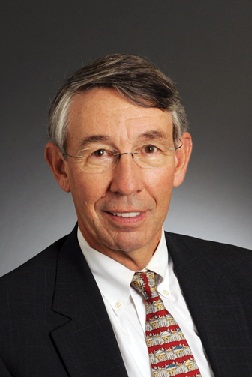Mason professor discusses the future of the Washington area economy
The Washington metropolitan area’s economy is always changing, but one Mason professor has an idea of what it will look like in the future.
Stephen Fuller addressed the topic of the Washington area economy on Feb. 18 during his Vision Series lecture at the Arlington campus’ Founders Hall. Fuller is a Mason professor of public policy and director of the Center for Regional Analysis.
According to Fuller, the Washington area is the most politically complex U.S. metropolitan region, given that the area is comprised of 22 independent jurisdictions.
“It’s hard to achieve anything regional here,” Fuller said.
 |
| Dr. Stephen Fuller led a Vision Series lecture on the future of the Washington Area's economy on Feb.18 (photo courtesy of George Mason University). |
Fuller explained how, as of 2012, the total Washington area population (5.8 million) is larger than the amount of available jobs (3.9 million).
“In 2042, there will still be more people than jobs expected,” Fuller said.
Sometimes Washington area residents have difficulty finding jobs locally, given that many Washington employees commute over long distances from other regions such as South Central Pennsylvania and Virginia’s Shenandoah Valley.
“D.C. imports more workers than any other metropolitan area in the country,” Fuller said. “We depend on other regional economies to support ours.”
Between 2007 and 2010, domestic migration into the Washington area increased by 11 percent.
Citing statistical reports from the Center for Regional Analysis, Fuller explained how the Washington area currently has the highest percentage of residents with graduate or professional degrees, as well as the highest median household income, out of all metropolitan areas in the United States.
However, Fuller noted that, compared to other U.S. regions, the Washington area has only the 4th largest economy.
Job growth is not as rapid in all parts of the Washington area. For example, job growth is higher in Northern Virginia than in the District of Columbia.
“Two thirds of all current regional job growth is in Northern Virginia,” said Fuller. He pointed out that, due to reductions in federal government spending, service industry jobs are increasing while federal government jobs are decreasing.
Fuller predicts that future Washington area job growth will be highest in the education and health service industries.
From December 2011 through December 2012, education and health services jobs in the Washington area have increased by 13,000. Additionally, there are over 50 million more Washington area jobs in these industries now than in 2010.
Overall, Fuller emphasized how the Washington area economy is continually affected by declining federal spending, wage and salary compression, as well as population change.
Fuller especially elaborated on how younger workers are continuously replacing older workers, as the overall Washington area population is aging.
“In 2012, people 65 years and older comprised 10.5 percent of the Washington area’s population,” Fuller said. “By 2029 they will comprise 15.7 percent.”
Fuller also noted the Washington area’s key development challenges: an increasing dependency on a non-resident workforce, a shortage of regional housing in which the future workforce can reside and a lack of effective regional leadership.
“Regional organizations and current leaders are not paying attention,” said Fuller. He explained how it is difficult for governing bodies to implement effective long-term policies at the regional level because of competition for business and development between Washington area suburbs.
Audience members found Fuller’s lecture relevant to George Mason University and Fairfax County.
Hugh O’ Hara of Falls Church appreciated learning how Fairfax County is among the Washington area’s more economically successful counties.
“It’s good to see that Fairfax County is competing very well,” O’Hara said.
Former Mason president Alan Merten was also in attendance.
“When the Washington area economy performs well, it is easier for Mason to attract good students and staff,” Merten said. “Likewise, Mason graduates are a high-quality workforce that enables the Washington area to grow.”
